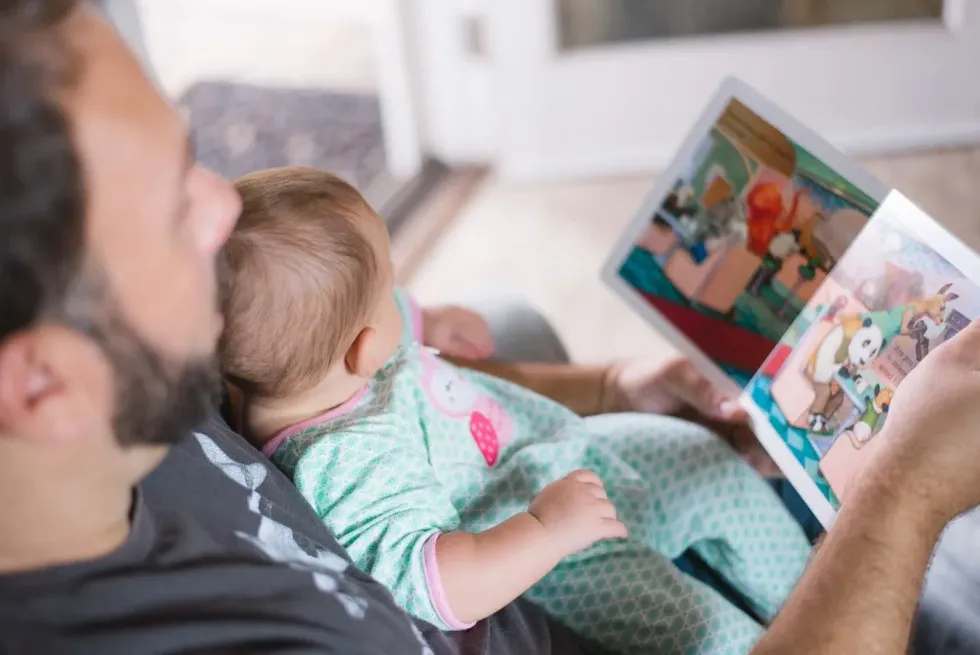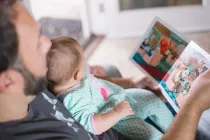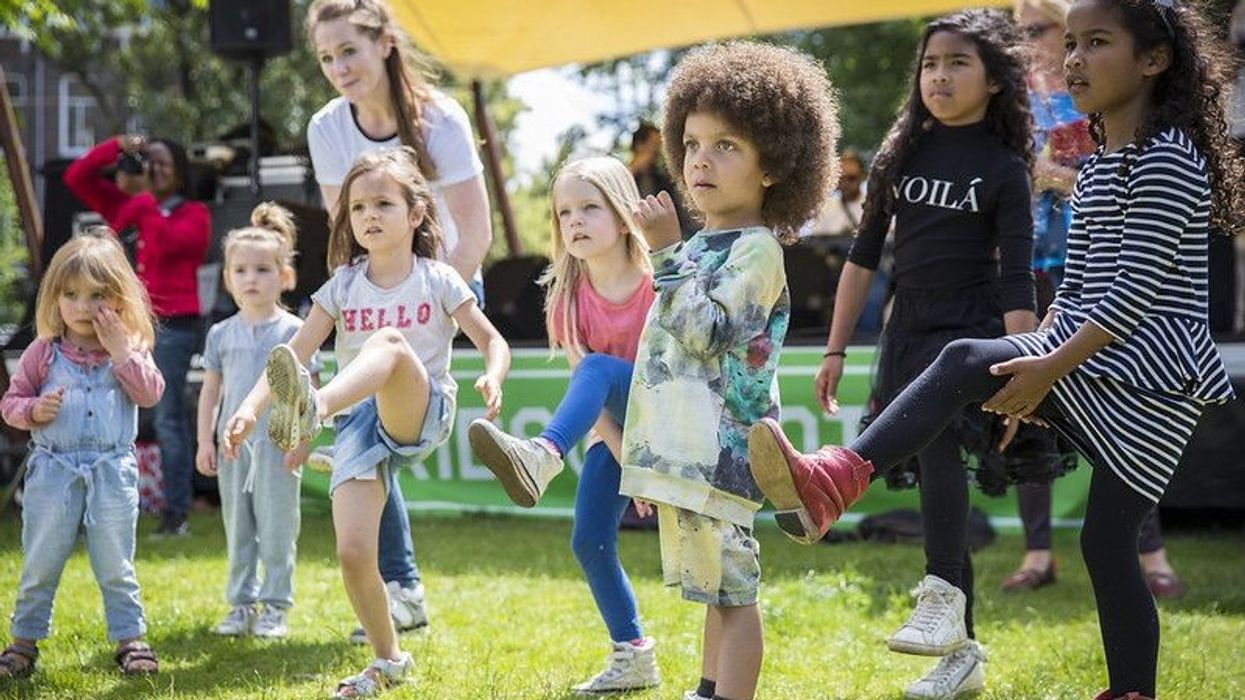Your Evening Routine: Setting Your Family Up For Success

Dinners almost ruined, you’re picking up toys with one hand and trying to reply to an email and diffuse a minor riot with the other, whilst thinking about lunch for tomorrow and clean clothes too: does this sound all too familiar?
We all know parenting at the end of the day is no easy feat, and it doesn’t come with a hard and fast rule book, though there are some great things you can do to help settle those hectic evenings. One such thing is developing an excellent evening routine; easier said than done, right?
Routines support bedtime, help with the amount of sleep you and your child get, and boost their overall productivity. What’s more, routines give children a real sense of stability and security.
Creating a routine doesn’t necessarily mean switching to a rigid timetable. It can just mean the same sequence of events, which will surely come as welcome news for those with unpredictable work patterns.
Morning routines and evening routines are great habits for all kids, from babies until they fly the nest. It’s also important to note that there is no one hat fits all solution with routines. Every household and family is entirely different and the important thing is to find or create a routine that works for you!
If you are interested in other parenting articles why not take a look at what to do if your 3-year-old's behavior is out of control or our [6th birthday party ideas] too?
Why Are Routines Important?
Routines help children understand the sequence of daily events and learn what’s expected of them. Children also manage change better when in the context of a familiar routine.
A predictable schedule allows them to feel in control and offers a sense of accomplishment, which we require well into adulthood. As they feel more independent, it enables them to tackle bigger changes, such as walking to school by themselves or staying at a friend’s house.
Of course, many sudden or unpredictable changes can’t be avoided.
What if you’re called away to something urgent, or there’s a bigger picture, such as separation, in motion? But that’s what makes routines all the more important, so children can rise to the bar and tackle the significant changes head-on when they need to.
Does this mean we have to begin a routine from day one of your new baby’s life? No, in fact, early parenting is all about adjusting to your child’s needs; we cannot force a baby to sleep at the same time as us or force them to adapt to our evening routine from the get-go.
It takes time to adjust as infants begin to learn. Gradually your routine and that of your children will synchronize into one that will work for you all.
There are many positives to introducing a stable routine. For one, routines, support with removing power struggles.
You will reduce the number of instructions you give and potentially confrontational situations.
For example, turning off the tablet or TV before dinner, brushing their teeth, and removing blue light screens before going to bed will hopefully become routine habits rather than requiring constant reminders on your part, because your child will come to know what’s expected of them.
Research has also found that children who get into regular habits can fall asleep better at night and achieve a greater night’s sleep than those who don’t.
With a routine, children also begin to pick up the concept of “looking forward” to an event.
For example, they may sometimes demand to go to the playground in the evening, but if they know going to the park is always part of the morning routine, they will start to look forward to this rather than demanding it at all times of day.
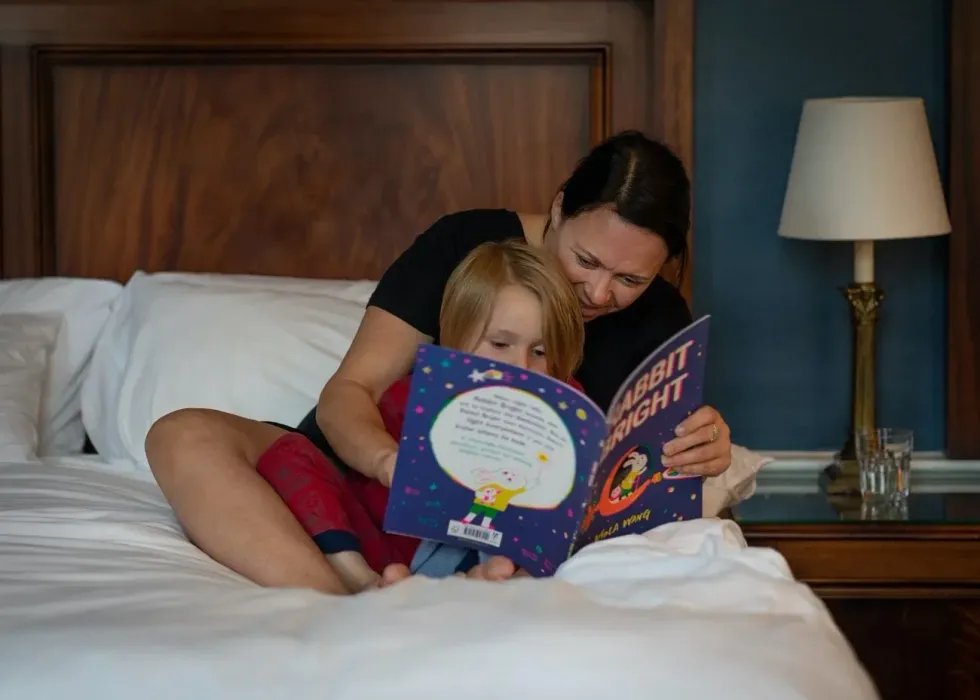
What To Include In An Evening Routine
The great Benjamin Franklin was a master of productivity, and his evening routine was very merely split into 6 p.m. to 9 p.m. for supper, tidy up, music or conversation, and 10 p.m. to 5 a.m. for sleep.
Benjamin Franklin was a real stickler for routine and productivity, he famously said, “lost time is never found again”. If you are looking for the evening routine essentials of the most productive people, these might be them!
However, while we don’t need to be quite a structured as Benjamin Franklin, we can take inspiration from his famous schedule, such as finding time for putting things in their places and having a clear up.
Consider All You Need To Achieve
An excellent place to start is writing down all the things you need to do in the evening, whether that’s dinner, bath, pajamas, reading, playtime, clear up, brush teeth, or any other evening essentials for your family, and put them into order.
Consider what time you would like the kids in bed by and begin to work backward. If you have to wake them up in the morning, they probably aren’t getting enough sleep, so you could set your routine to incorporate an earlier bedtime.
Decide which tasks you can most realistically stick to each day as a family.
Naturally, the evening routine for babies compared to a routine for a three-year-old and a ten-year-old would look somewhat different. The biggest challenge many parents face is when they have two children of different ages. But just because you may all have different priorities doesn’t mean your whole family can’t have an evening routine checklist.
As aforementioned, speak to your children at the age of understanding about how they feel about the routine. Is anything forgotten with getting ready for bed, do they want to do an activity such as reading as part of the routine?
Address the routine, so the child feels it belongs to them and they “own”, and, where you can, give them as much choice within reason as possible. Consider which activities are calming for everyone and encourage these.
Print It Out
Get printing your schedule, stick a copy on their bedroom door, and one in a communal area. You can add photos of them doing each activity, so it becomes a visual schedule and involve them in the process of making it to make the routine more exciting.
This also gives them a sense of ownership of the routine.
It's a good habit to do the same thing for the morning, and print a schedule for this next routine too. You can alternate them so it does not seem like there is too much work to be done at once if required.
Tips For Sticking To An Evening Routine
Prioritize Sleep
Make sleep a real priority for the entire family, and try to keep to the same bedtime and wake-up time for everyone in the house.
While that might sound easier said than done, it’s can be made easier by working together as a team (be it with a partner or with your children themselves).
Everyone must be on the same page when it comes to getting the kids to bed, and consistency is a significant factor to make it work. You can use a visual timetable for younger kids and incorporate some time without blue light before it is time for lights off.
For children at a higher level of understanding, you can explain why it’s important, and then devise the best evening routine and good habits together.
Sleep Environment
Evening routines also include a change of dress, which can be a good cue for little ones that it’s time to begin winding down their mind. Dress your child in pajamas that you’d wear for the particular season, and remember, children often kick off covers and don’t pull them back on.
Rooms that are too stuffy also make it tricky to sleep, so get to grips with how hot it is in your kids’ bedroom and try to keep to an ideal temperature.
Aim for a cool climate, but comfortable. First thing in the morning you can open windows to allow fresh air in.
“Just One More Thing...”
Finally, your little one’s head is down to rest, then suddenly they ask for that “one more thing”. It could be one more hug, another drink, or a trip to the bathroom.
If you notice this habit occurring, do your best to make these activities a part of the evening routine or set a limit (for example, allowing them to choose two bedtime stories each night).
Let your child know that once they are in bed, it’s time to stay in bed.
If they get up, try your best not to give a reaction, and gently hand-in-hand lead them back to their bed. If you read one more story or allow them to stay up extra hours, you may be sending out mixed messages and undoing the hard work you have already put in place.
Make It A Team Effort
Sticking to time slots and fixed hours prevents you from being the mean bedtime cop every night. After all, it’s just the schedule, and the whole family has to follow it.
The habits shaped in early life will help your kids to identify self-awareness of how many z’s they need to get to feel well-rested. It will support them with how to get ready and go to bed every night as they grow older.
Choose Activities Carefully
Think carefully about which activities calm your children. Things like books, showers, and baths help people calm down and fall asleep quicker. Do remember to remove those blue light devices, and social media access at least an hour before bed.
Sample Evening Routines
Your family routine could look something like this:
6 p.m. - 6:30 p.m.
Dinner time for the whole family.
6:30 p.m. - 6:45 p.m.
After dinner, everyone pitches in with the clean-up effort to tackle the important everyday things together. Now’s a good time, if your child needs, to let off any physical steam through play. Too close to bedtime, it may result in them having difficulty in falling asleep and switching off their mind.
6:45 p.m. - 7:15 p.m.
After dinner and break, set a bathtime for your youngest child, followed by pajamas, and teeth brushing. During this time, your older child (if you have one) will need to keep themselves occupied, and it’s a good idea for you to check in now and then.
It’s a great time for them to start the process of relaxing and winding down their mind. They can play, but try your best to avoid blue light and screens.
This is because blue light reduces melatonin, which is needed to help them get a good night’s sleep. Ideally, any pending homework would be finished before dinner, but if not, this can also be done now if your child can manage by themselves.
7:15 p.m. - 7:40 p.m.
Your 9-year-old bathes, brushes their teeth, and changes into nightwear. They can also pick out their clothes for the next morning and pack their back now. It might be quite a lot to remember at this step, so you can make a list for them to check off if required.
Now for your three-year-old: get them into their nightwear (if they aren't already), into bed and reading a book with you.
7:40 p.m. - 8 p.m.
Your 9-year-old can read independently in bed and it's lights out for your youngest. This offers up some precious time to lay with your child and give them affection before you leave them to sleep. Make a few check-ins after you go, so your little one feels secure and can fall asleep independently.
This schedule is assuming your household will awake at 7 a.m. and that your three-year-old will still have a nap, so approximately eleven hours of sleep is ample for a growing brain.
8 p.m. - 8:30 p.m.
Back to your nine-year-old. Assuming they will also get up at 7 a.m., your child will still require ten hours of quality sleep for them to be well-rested and productive.
For this to happen, make sure lights are off by 8.30 p.m. and give a 30-minute window for them to fall asleep.
You can use this time to read with them or reflect upon the day, it truly is a precious productive bonding time. You can sing together, cuddle up, or say prayers if you wish, and use this time to wind down within your evening routines.
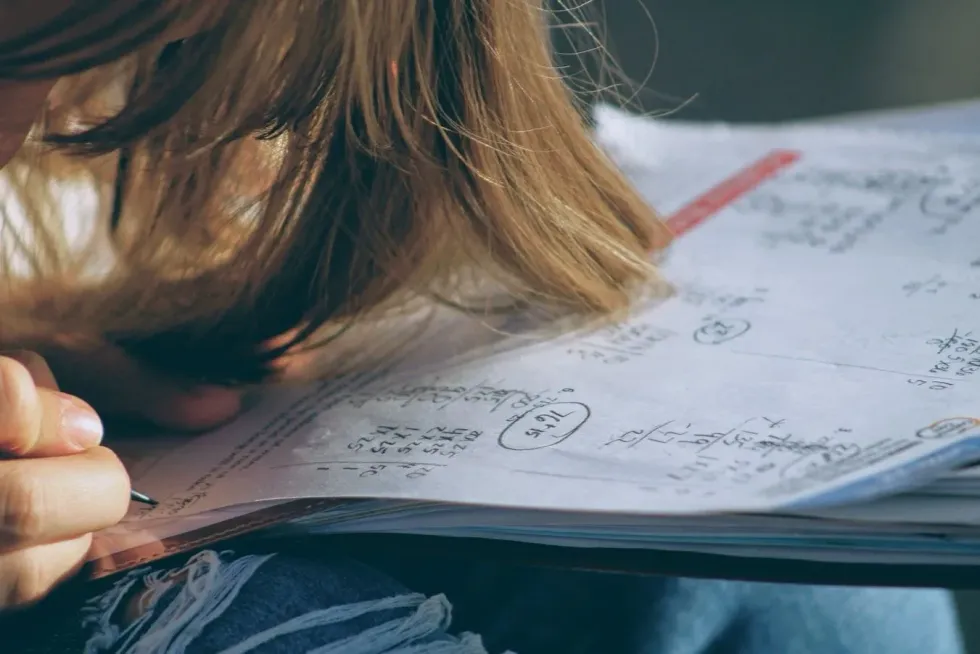
Why Is This A Good Example?
There are many great aspects to an evening routine like this. Firstly you get to stagger the bedtimes, which means you have a unique time slot to bond with each child alone.
This is important quality time as kids get older. You may find they genuinely begin to open up, reflect, or raise any issues on their mind within these hours.
Not to mention if you have been rushed off your feet all day, it is a great time to check in with them and discuss what was done today, especially during those tricky pre-teen years. They will require an emotional anchor to you, and these are all important parts of an evening routine.
What’s more, each child benefits from the stability of a predictable productive bedtime routine. Multiple researchers have found this is linked to a night of better sleep for everyone in the household, happier kids, and a more productive brain.
As your children begin to grow older, they will learn to become more independent in the long term, and take care of themselves. This may involve learning how to use a shower independently and brushing their own teeth. This is because you will have played an integral part in creating this habit every day.
It’s also a good idea to include them in packing their own school bag and selecting their clothes for wherever they are going the next day. Preparing for the next day like this helps with independence skills and makes the morning routine calmer.
It gives time to allow for any complications, such as needing a clean gym kit or searching for rainboots for an outdoor trip and saves time looking for important things in the morning as you start your day.
Don't Forget Your Routine Too
Now, what about your morning and evening routine? It's a good idea to set an evening routine for adults in your house to unwind and relax the mind before bed too.
Evening routine ideas could be some time with your partner, quality time alone, relaxing with a favorite film, reading a book, or starting an evening yoga routine. Make sure you fall asleep ready for the next day morning routine every day, as your kids certainly will be!
If you found this article helpful, then why not take a look at this guide to a 10-month-old schedule or how to pack your bags ready for the day ahead?
We Want Your Photos!
More for You
See All
Bachelor of Arts specializing in French with Film Studies, Bachelor of Arts (Year Abroad) specializing in Literature, History, Language, Media, and Art

Georgia StoneBachelor of Arts specializing in French with Film Studies, Bachelor of Arts (Year Abroad) specializing in Literature, History, Language, Media, and Art
Georgia is an experienced Content Manager with a degree in French and Film Studies from King's College London and Bachelors degree from Université Paris-Sorbonne. Her passion for exploring the world and experiencing different cultures was sparked during her childhood in Switzerland and her year abroad in Paris. In her spare time, Georgia enjoys using London's excellent travel connections to explore further afield.
Disclaimer
1) Kidadl is independent and to make our service free to you the reader we are supported by advertising. We hope you love our recommendations for products and services! What we suggest is selected independently by the Kidadl team. If you purchase using the Buy Now button we may earn a small commission. This does not influence our choices. Prices are correct and items are available at the time the article was published but we cannot guarantee that on the time of reading. Please note that Kidadl is a participant in the Amazon Services LLC Associates Program, an affiliate advertising program designed to provide a means for sites to earn advertising fees by advertising and linking to Amazon. We also link to other websites, but are not responsible for their content.
2) At Kidadl, we strive to recommend the very best activities and events. We will always aim to give you accurate information at the date of publication - however, information does change, so it’s important you do your own research, double-check and make the decision that is right for your family. We recognise that not all activities and ideas are appropriate for all children and families or in all circumstances. Our recommended activities are based on age but these are a guide. We recommend that these ideas are used as inspiration, that ideas are undertaken with appropriate adult supervision, and that each adult uses their own discretion and knowledge of their children to consider the safety and suitability. Kidadl cannot accept liability for the execution of these ideas, and parental supervision is advised at all times, as safety is paramount. Anyone using the information provided by Kidadl does so at their own risk and we can not accept liability if things go wrong.
3) Because we are an educational resource, we have quotes and facts about a range of historical and modern figures. We do not endorse the actions of or rhetoric of all the people included in these collections, but we think they are important for growing minds to learn about under the guidance of parents or guardians.

